Spoilers, spoilers everywhere, so please O' please, watch the film first.
Director: John Huston
Screenplay: John Huston and Story by Dashiell Hammet
Starring: Humphrey Bogart, Mary Astor, Peter Lorre, and Sydney Greenstreet
Images from the Warner Bros. 3-disc special edition.
I find I have the most trouble looking at films that have become so iconic and canonical, that their reputation threatens to obscure what makes them great in the first place. Two films I've been hesitant to include on my favorites list are John Huston's The Maltese Falcon and Orson Welles's Citizen Kane. Having recently rewatched them for maybe the 6th time each, I've decided I can no longer omit them based solely on an aversion to cinematic cliche.
They are remarkable pieces that reward multiple viewings. It's interesting to see the similarities: They are both 1941 best picture nominees whose reputations have far exceeded that year's winner (How Green Was My Valley?). They are the debut features of two great talents in american cinema, John Huston and Orson Welles. Finally, their influence on subsequent films is titanic, to say the least. The Maltese Falcon is oft-cited as one of the very first film noirs, sparking american cinema's most influential movement. Citizen Kane helped usher in the idea of the auteur. That is, the idea that the director is the author of the film, more so than the screenwriter, the actor, the cameraman, the editor, etc.. The big difference between the films, however, is that while The Maltese Falcon is a faithful adaptation of Dashiell Hammet's novel by the same name (adapted twice beforehand as The Maltese Falcon (1931) and Satan Met a Lady), Citizen Kane is quite the opposite: a completely original work. I think what this shows us is that to make a great film, it is not so important as to where the story comes from, but how it is told.
The Maltese Falcon tells the story of private detective Sam Spade, who is involved in a plot with shady characters hell-bent on acquiring the illusive and eponymous "Maltese Falcon," a classic MacGuffin, all the while trying to solve the murder of his partner, Miles Archer and blah, blah, blah... I believe people who watch The Maltese Falcon (or film noir in general) for the story are missing the point. Many film noirs (Out of the Past, The Killing, Touch of Evil, The Third Man, Double Indemnity, etc., etc.) have twisted and convoluted plots, and personally, I don't really care about sorting out all the details. Film noir is more about mood and texture than anything else. It's about moral ambivalence, corruption of the soul, and a profound melancholy and disillusionment about the world. These themes are the meat of film noir, and the convoluted plot is more of a byproduct of these ideas.
I think one of the central dichotomies of The Maltese Falcon is the relationship between Sam Spade and his partner, Miles Archer. Odd to say, given that Miles is given about 4 minutes of screen time before he is shot dead by some unseen gunman. Miles is someone I almost completely forgot about the first time I saw The Maltese Falcon. Study his body language and contrast it with Sam's, and you'll see an important difference.
Sam and Miles both have the same temptations. It's a question of fortitude that determines their survival. In the opening scene where Ms. Wonderly lays out her web, I noticed that Sam's gaze does not falter. He invariably looks Wonderly in the eyes, even as she averts her gaze, studying her and trying to determine whether she is trustworthy. Even when she pulls out a pair of hundred dollar bills to bribe the detectives, Sam's eyes barely glance at them. Contrast this with Miles, who's eyes are constantly darting from the bills, to her face, and searching up and down her figure, checking her out.
The detective's names are equally contrasted. Spade is a worker. Tough, consistent and determined in his work. Archer's name suggests he is flighty and aims high, a reach that oft-exceeds his grasp. This is the yin and yang of film noir. Miles succumbs to his male temptations and is dead. Sam controls these temptations and survives.
Sam is a tricky character to decipher, and I'm never sure just how much he is tempted by greed and Ms. O'Shaughnessy/Wonderly. His ambivalence is what makes the film so fascinating. It's not so interesting to see what he does without thinking about why he does it. Here he is "comforting" Miles's widow, Iva:
His relationships with women, and everyone else for that matter, are guarded, and it seems the only person he trusts is his secretary, Effie.
The Maltese Falcon has some of the best character actors in the biz, such as Peter Lorre as the umbrella-fondling Joel Cairo:
There is also Elisha Cook, Jr. as Wilmer, who would later star in a similar role in Stanley Kubrick's The Killing. Wilmer is representative of those hot headed adolescents who brandish their pistols but lose them without a moment's notice when they try threatening people like Sam Spade.
I've always felt that film noir is especially good at capturing the pitfalls of masculinity. It's interesting because in The Maltese Falcon, Bogart plays a character who is able to rein in his temptations and not become overcome by them. In Huston's The Treasure of the Sierra Madre, Fred C. Dobbs has the same male temptations, but his own temperance is completely broken by the end of that film. I suppose Spade has many of the same flaws as any man, but he channels them in a different way. Like when he beats the snot out of Joel Cairo, who had a gun pointed on him. Or when he explodes in anger at Gutman. When he walks out, he calmly reels in that anger, pleased with his ability to control his emotions.
Another character actor who would star in the equally iconic Casablanca, is Sydney Greenstreet, making his debut screen appearance as Kasper Gutman.
As in The Treasure of the Sierra Madre, Huston uses low angles masterfully, and I never tire of looking at them. They are indicative of many things. Shifts in allegiance, subversion, towering greed and folly. All things that are attributed to film noir.
Sydney Greenstreet as Kasper Gutman is one of the film's most indispensable roles. I absolutely cannot see anyone else play him. His frame and his name are so perfect for a man who has spent 17 years looking for the falcon, and will determinately spend another 17 looking for it. I'm always amazed at how well he takes the news of discovering the false falcon. It's as if he's fed on his dreams, and judging from his size, you can tell he dreams a lot.
These final scenes are some of my favorite not only for the suspense, but for the business-like transactions being performed on deciding who murdered who and when Sam will get paid. I wonder whether John Huston knew just what he was making, as the final 30 minutes or so seem almost prophetic of film noir's focus.
Who sits closest to the camera, on the lower right of the frame? Why, it's none other than the noir hero and the femme fatale. I like to think of this as the director's chair they're sitting in. After all, the noir hero is often at the center, orchestrating the convoluted plot in front of our noses. Yet, who sits in the hero's shadow? It is the femme fatale of course. In many ways, she is the one who really sets the events in motion and stands back to see how they play out. As it must to all femme fatales, her comeuppance will arrive:
This final shot of O'Shaughnessy is one of my favorites. I love how the elevator gate forms a crow's foot (or should it be falcon's foot?) across her eye.
The Maltese Falcon is a very cool film. I find that it's one of those rare ones that gets better and better the more you see it. As I've said, I am very much opposed to letting a film's reputation sway my opinion of it, which is easier said than done. For that reason, I tend to avoid calling a classic/iconic/canonical film one of my favorites until I've given it plenty of time and thought, which I feel I've finally given to The Maltese Falcon.
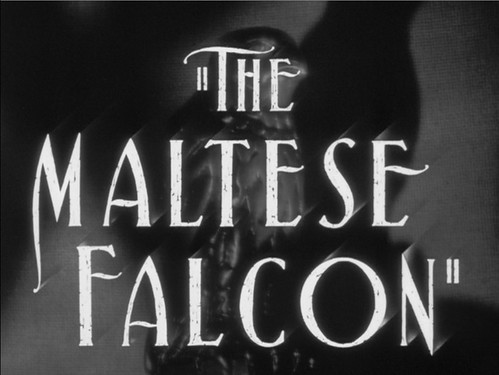
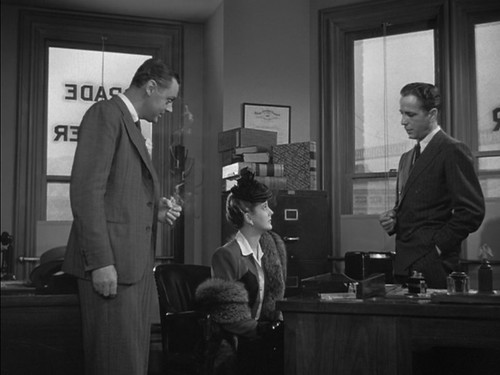

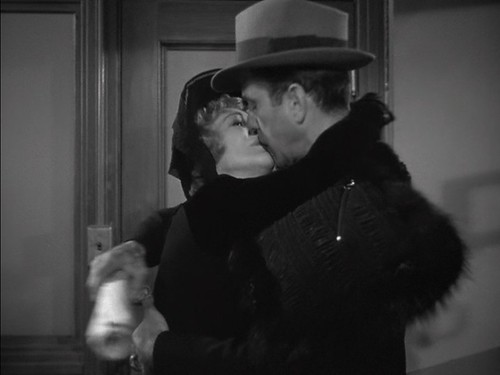
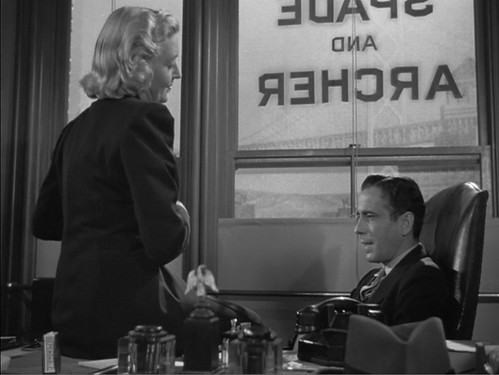
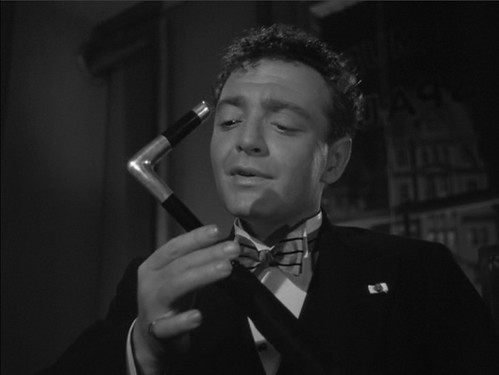
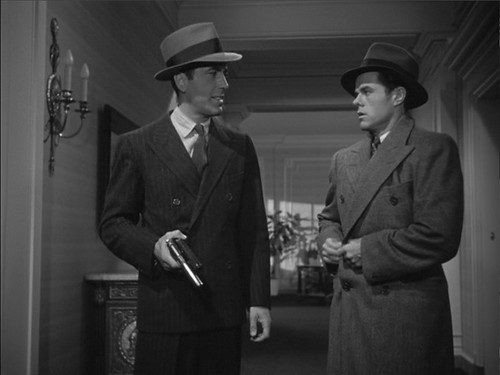
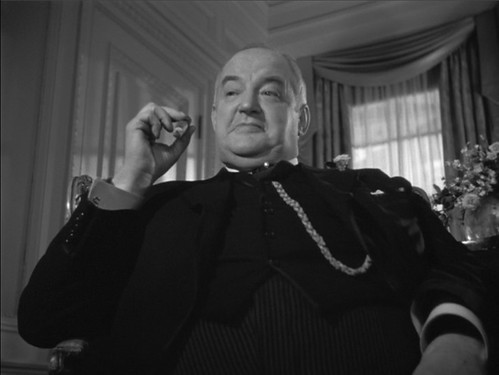
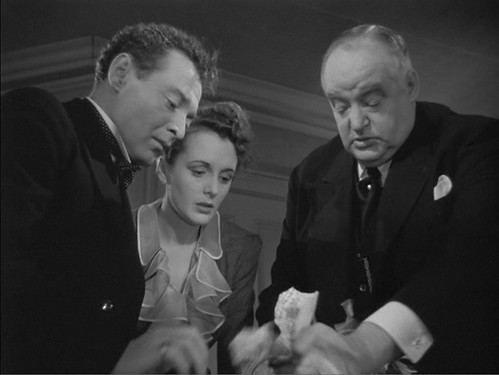
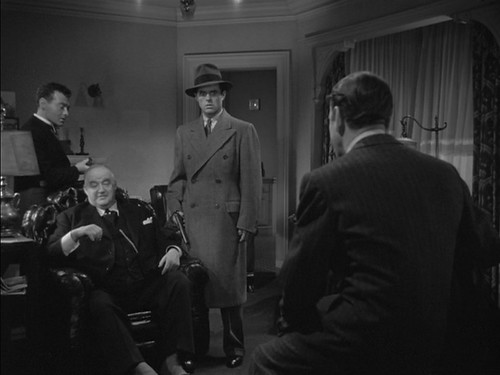
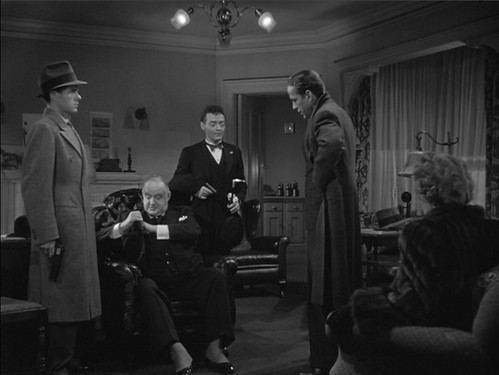
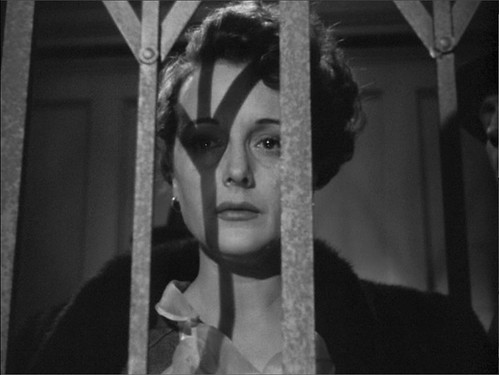
No comments:
Post a Comment